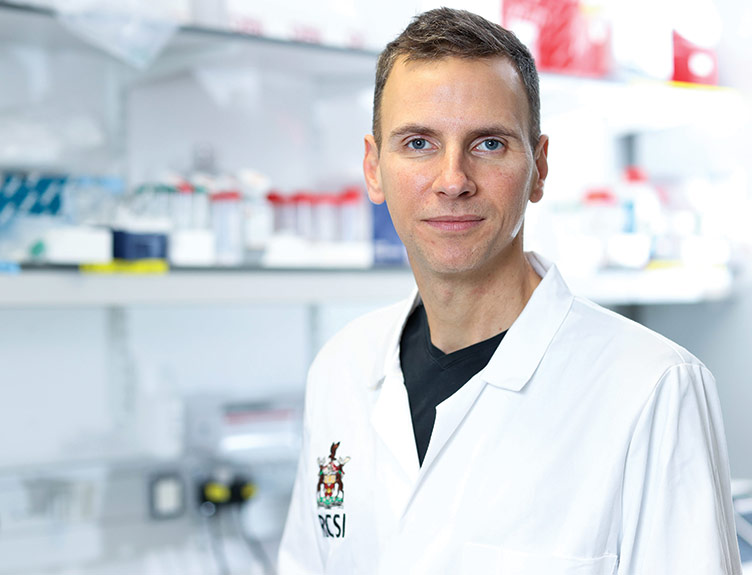Mobile Surgical Skills Unit sets sail to Africa to assist surgical care crisis

RCSI has today announced the launch of a Mobile Surgical Skills Unit which will set sail from Dublin to Arusha, Tanzania. Mr Joe Costello, Minister of State for Trade and Development visited the 30 tonne Unit outside RCSI in St Stephen's Green today to announce the launch.
The Mobile Surgical Skills Unit is equipped with surgical training technology such as virtual reality simulators to train surgical trainees in hospitals across five of the ten COSECSA countries, namely: Kenya, Uganda, Burundi, Rwanda and Tanzania. It can accommodate ten surgical trainees at one time and will deliver surgical training to world-class standards. The initiative is part of a well-established partnership initiative between RCSI, Irish Aid and the College of Surgeons of East, Central and Southern Africa (COSECSA).
Speaking at the launch event Mr Joe Costello, Minister of State for Trade and Development, said: "I am delighted to be here today to launch the RCSI/COSECSA Mobile Surgical Skills Unit. This initiative will contribute to increasing the provision of quality, essential surgical and emergency care in East, Central and Southern Africa. Partnerships such as this contribute to major, sustainable improvement to health systems in those countries which are most vulnerable. This initiative is an example of the Government's Policy on International Development to harness the skills of Irish health experts and institutions to improve access to quality essential health services."
Mr Declan J. Magee, RCSI President, said: "Basic surgical skills are an integral part of surgical training and simulation-based surgical training provides trainees with the opportunity to learn outside the operating room in a non-patient, stress free environment. However, widespread adoption of simulation technology especially in medical education is often prohibited by its high cost, limited space, and interruptions to clinical duties. The Mobile Skills Unit is a way of addressing some of these limitations by teaching surgical trainees the necessary skills in their own hospital settings."
There is a surgical care crisis in Africa. Sub-Saharan Africa has the highest ratio of surgical Disability Adjusted Life Years (DALYs), which is a measure of the overall disease burden and the highest rate of obstetrical complications in the world. However current estimates suggest that 11% of global disease burden is due to conditions which can be treated by surgery.
Francis Kaikumba, CEO of COSECSA, said: "We are deeply touched and grateful for the RCSI's generous offer of the Mobile Surgical Skills Unit. This unit will enable us to accelerate and expand our surgical training offer immensely by helping COSECSA to reach a wider pool of students, especially those in rural settings who struggle to access such courses. Most importantly this Surgical Skills Unit will help COSECSA immeasurably in providing a cost effective college "without walls" approach to surgical training. Our approach involves world class in-service training complemented by a unique e-learning education platform. This enables our surgical trainees to develop both their clinical and academic skills, without having to leave their posts while working towards a professional qualification that is widely recognised across the COSECSA region; a region that is facing an acute surgical manpower crisis where there are only 1,400 surgeons serving a population of a quarter of a billion people."
Until recently, surgery was not considered as part of the health strategy in low-income countries because it was considered to be unaffordable. This is now changing and surgery is being increasingly recognised as an integral part of primary healthcare and a cost effective method of responding to health challenges in countries like Africa where resources are scarce.
In the COSECSA region, the ratio of qualified surgeons to the population is one per 190,000 people compared to approximately one per 2,800 in the UK. Resources such as the Mobile Surgical Skills Unit will enable more surgeons to be trained to work in the region and address this manpower crisis.
In 2006, RCSI pioneered the world's first dedicated mobile surgical skills training unit. The launch of the Mobile Surgical Skills Unit in Africa is testament to RCSI's commitment to its mission of educating, nurturing and discovering for the benefit of human health. The Unit will leave Dublin in mid-July and it is expected to arrive in Tanzania in mid-August.
COSECSA was formed in 1999 to advance education, training, exam standards, research and practice in surgical care by increasing the number of appropriately trained well qualified surgeons and surgically trained general medical officers. The college was formed by the Association of Surgeons of East Africa, which is itself over 60 years old, and which has recently merged with COSECSA. In 2007, RCSI, COSECSA and Irish Aid initiated a partnership programme to advance COSECSA's mandate and improve its operating capacity. To date 102 surgeons have graduated from the COSECSA programme and over 260 are now currently in training.



